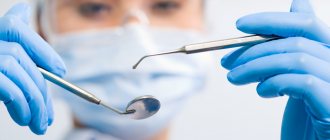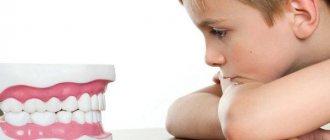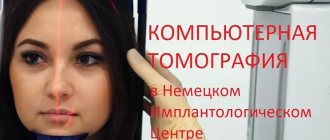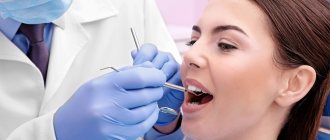body .attr-article__date{ background: none; padding: 0; }
NEAD EAD SEAD South Administrative District South-Western Administrative District CJSC Central Administrative District SZAO Northern Administrative District 01 02 03 05 06 07 08 09 1 0 1 1 1 2 14 18 15 16 17 Babushkinskaya Prospekt Mira Pervomaiskaya Baumanskaya Paveletskaya Teply Stan Shipilovskaya Prague Academic University Barrikadnaya River Station Oktyabrskoye Bratislava Taganskaya Academician Yangelya October Field
The call center is open 24 hours a day
Ambulance 24/7
Home Health from A to Z Useful information Preparing a child for the first visit to the dentist
Date of publication: 04/04/2016
until January 31
We are giving away 1000 rubles for all services for a visit in January More details All promotions
Is psychological preparation necessary for a child’s first visit to the dental office? - Of course, it is necessary. Its main goal is to prevent your child from feeling nervous or anxious before visiting the clinic, and to encourage the child to cooperate with the doctor.
Top tip:
Child at a dentist appointment
- If the reason for the visit is pain:
convince the child that the dentist will help - the pain will become less or go away completely. - If there is no pain and the first visit to the dentist is done as planned:
you should not try to prevent the child’s negative reaction by saying: “don’t be afraid,” “it won’t be scary,” “it won’t hurt.” He doesn’t yet know that he should be afraid of something. It is better to set your child up for a positive outcome from the visit.
You can say to small children: “The doctor will look at their teeth, brush them, and they will be happy.” For older children, rational argumentation is appropriate: “Go to the dentist, your teeth will be healthy and beautiful.”
Some more general tips:
- When going to the dentist, do not focus on this.
- Do not emphasize the importance, exclusivity, or even more so the unpleasantness of the event. A visit to the doctor should be a given.
- Don't say that the doctor won't do anything.
- This is not true, and then the child will understand that he was deceived. Tell them that the doctor will look at your teeth and treat them if they are sick.
- Do not use the “scary” words “prick”, “drill”, “drill”, “drill”.
- You can play at visiting a doctor.
Tell us how to enter an office, sit in a chair, open your mouth and keep it open. Do every action with your child, take on the role of a doctor.
What to tell your child:
Each child is a unique personality, and each needs an individual approach. But we can offer a general outline of the conversation. If the child is small and hardly understands why and why they want to take him to the dentist:
- say that you will go together to a good doctor who will treat your teeth. All the children go to him because he loves them and treats them. All boys and girls come out cheerful and healthy from him.
- Explain what the good doctor will do: “He will look at your teeth to see how they are growing.”
- Give a couple of “strong” arguments: “When dad and mom were little, they also went to the doctor to check their teeth.” Or: “This doctor had...” (name a fact known to you: the eldest child in the family, a neighbor’s child, etc.).
- Emphasize that you will be nearby at all times in the doctor's office.
If the child is older and understands his dental problems, proceed as follows:
Preparing for a visit to the dentist
- Talk about why it is important to have healthy teeth.
- If your son or daughter says that they are afraid of the dentist, you will be sincerely surprised: “Why should you be afraid of the doctor? He helps us get rid of troubles, advises, heals, and takes care of our health.”
- If you yourself have ever expressed fears in the presence of a child before a visit to the dentist or shared unpleasant memories, admit the error of your position: “I was also scared, but everything turned out to be different - attentive doctors, painless treatment. The main thing is to set yourself up positively.”
- Finally, show your willingness to support your child: “Let's go to counseling together. I will be present in the office during your conversation with the doctor.”
(According to the article by Professor V.V. Boyko, a dentist of the highest category, “How to prepare a child for a visit to the dentist”).
Important!
The pediatric dentists at Family Doctor are true professionals. They love children and strive to find an individual approach to each child. However, the best results are achievable with the cooperation of the doctor and parents.
Make an appointment Do not self-medicate. Contact our specialists who will correctly diagnose and prescribe treatment.
Make an appointment
History taking
Each treatment begins with a history taking. Taking an anamnesis is a process in which a specialist finds out from the patient’s mouth the history of the patient’s medical life: previous and concomitant diseases, injuries to the maxillofacial area; the presence of allergic reactions to medications, in particular anesthetics; information about medications taken; reasons for seeking dental care.
All information received is recorded in the medical record of the dental patient.
Don't scare or threaten
Under no circumstances should the prospect of going to the doctor be used as a threat. Avoid phrases like “if you don’t brush your teeth properly and on time, I’ll take you to the dentist!” Fear never works. As a result, the baby will still not take care of hygiene, and it will become even more difficult to bring him to the doctor.
Children are emotionally like little radios that instantly pick up the wave of their parents' mood and begin to worry if it is a wave of negativity. Behave calmly, kindly and confidently. Then the baby will not have any fears. And remember that caution is not an effective technique either. Usually they even lead to the opposite result - for example, statements like “don’t be scared, it won’t hurt,” on the contrary, can create more fear in the baby. It’s not for nothing that adults generally talk about pain! Something is wrong here…
What does the dentist do during the examination?
If there are no complaints, the initial examination proceeds according to the standard plan.
Visual assessment. The doctor examines the crowns, gums, mucous membranes (inner surface of the lips, cheeks), palate, checking:
- the presence of soft plaque and hard deposits on the enamel and in the gum pockets. Tartar accumulation indicates ineffective hygiene and requires professional cleaning. It is removed to check that there are no demineralized areas or caries underneath;
- general condition of the enamel: its color, transparency, gloss, presence or absence of mechanical defects. During examination, the doctor can identify chips, wedge-shaped defects, erosion, demineralization;
- signs of gum inflammation: swelling, discoloration, thickened areas, ulcers, etc.;
- condition of the mucous membranes (assessment of symptoms of gingivitis, traces of frequent mechanical injuries, burns, irritation or inflammation);
- condition of the palate, tongue (signs of injury, plaque deposits, traces of inflammation, erosion).
The color of the enamel is assessed separately. Its changes may indicate pulpitis (becomes gray), the use of certain medications (the shade changes to yellow or pink, may require bleaching), demineralization or caries in the stage of a white or dark spot (enamel lightens, loses its gloss, and then darkens, may turn brown or almost black).
Probing. It is carried out to control the strength of the enamel and evaluate the surface of the crowns. For this, a special tool is used - a probe. Such diagnostics allows us to identify caries, determine its stage, and the degree of tooth destruction. Probing also helps to diagnose non-carious lesions: fluorosis, hypoplasia, enamel erosion. It is carried out both for healthy and already filled teeth. If the crown has been restored, using a probe you can identify secondary caries and assess the condition of the fissures on the chewing surfaces. The tool should be blunt, angular, with a notch at the end. Probing is painless: the dentist simply runs a blunt end over the surface of the crowns, assessing the smoothness or roughness of the enamel and the degree of its hardness. The same technique is used to control gum pockets. The end of the probe is inserted into the groove behind the edge of the gum on all four sides of the crown. The immersion depth of the tool should not exceed 1 mm. If it goes deeper, the gum pocket is enlarged and this may indicate periodontal disease.
Using a probe, the gaps between your own tissues and the edges of the fillings are additionally checked. If they are enlarged (there is a noticeable joint that can be felt when the instrument is passed over the crown), this may require retreatment. When probing, the doctor can detect softening of dentin under the chewing surface, deposits of tartar on the neck of the tooth, under the gingival margin.
Palpation. It is carried out to assess the condition of the periodontium and identify hidden inflammation. With this diagnosis, the tooth is moved with tweezers in different directions, assessing its movement in the alveolus and how much it can move. If even with a slight force the crown moves, this indicates inflammation and swelling of the tissue. They can occur after injury, with periodontitis, periodontal disease, and periodontitis.
Additionally, they check in which directions the crown moves (only in one, two, three, in any direction, vertically, with the possibility of rotation, scrolling around the axis). When performing palpation, the doctor evaluates the patient’s sensations (is there any pain, sensitivity, during which movement of the crown is the pain most intense). When the tooth is rocked, bloody or purulent discharge may appear; the doctor may detect swelling or compaction, and this also helps to make a diagnosis. Traditional palpation (palpation) is carried out for the gums, inner surface of the cheeks and lips, if inflammation or other pathology is suspected.
Percussion. This is tapping the crowns with a probe handle or tweezers. The movements should be light, each tooth is tapped on the sides and on the top surface. The appearance of pain with a horizontal blow may indicate periodontitis, with a vertical blow it may indicate inflammation of the nerve or pulpitis. By assessing during percussion exactly in which places, during which tapping pain appears, and how severe it is, the doctor can make a preliminary diagnosis.
In some cases, radiography may be required during the initial examination. It helps to assess the condition of bone tissue, roots, and the filling density of the root canals if the tooth has already been filled.
Prevention and early diagnosis
Modern standards for the prevention of caries, gingivitis, periodontitis and other diseases imply regular professional cleaning of the oral cavity. This is necessary both for those who carefully observe the rules of hygiene at home, and for those who suffer from increased plaque formation.
Complete removal of soft dental deposits at home is almost impossible; even with a properly selected brush and toothpaste, hard-to-reach places are less susceptible to cleaning. Plaque can be completely removed only in a dental office. As a rule, if the initial condition of the oral cavity is good and there are no dental structures (braces, retainers, etc.), it is enough to do this twice a year. Such measures will prevent the appearance of tartar, and therefore significantly reduce the likelihood of developing caries, periodontitis, periodontal disease and other serious diseases.
In the event that tartar has already appeared, ultrasonic technology will come to the rescue. It can be combined with the Air Flow method, which removes soft plaque. In combination, impressive results can be obtained.
Early diagnosis of inflammatory diseases of soft tissues, as well as carious lesions of the enamel, allows timely action to be taken and complications to be prevented. A careful examination by an experienced dentist makes it possible to suspect the onset of a disease or identify risks, which means taking the necessary measures in a timely manner.
Examination and consultation with a dentist at the Profident clinic
At the PROFI-Dent dental clinic, consultations are conducted by doctors of all specialties, which makes it possible to take a comprehensive approach to the development of treatment plans.
The latest technologies and developments in the field of diagnosis and treatment of dental problems are at your service:
- X-ray diagnostics;
- Digital visiograph and orthopantomograph;
- Ultrasound and laser systems;
- Advanced treatment protocols;
- New generation materials and preparations.
The dentist will conduct a full diagnosis, identify the problem and, if necessary, refer the patient to a specialist. And a flexible pricing policy makes it possible to make the cost of a dental consultation affordable for any patient.
Treatment methods used in dentistry
Depending on the problem that has arisen, the following methods of treatment, restoration, restoration of teeth and other oral tissues can be used:
- Treatment of caries using remineralizing drugs or drills and filling materials.
- Treatment of pulpitis using vital/devital amputation or pulpectomy.
- Treatment of periodontitis – resection of the root apex, coronal-radicular separation, root amputation, tooth extraction.
- In surgery – tooth extraction, tooth-preserving operations, surgical operations on bone or soft tissues of the oral cavity.
- In periodontics – splinting, curettage of periodontal pockets, treatment of gums using the Vector apparatus, deepening the vestibule of the oral cavity.
- In orthopedics – installation of implants, prostheses and microprosthetics (veneers, lumineers, inlays, crowns, bridges, complete prosthetics). As well as bone grafting and bioreconstruction.
- In orthodontics – treatment using braces, mouth guards, removable and non-removable plate devices.
- Preventive measures - hygienic cleaning with removal of plaque, fluoridation of teeth. Sealing of fissures, remineralization of teeth (in pediatric dentistry).
- Teeth whitening – Zoom, Amazing White, Beyond Polus systems, custom-made mouth guards.
A dentist is a doctor who will effectively and painlessly cure/correct any pathology, anomaly, disorder, disease, or injury to the tissues of the oral cavity. If your tooth hurts, your gums bleed, ulcers appear on your tongue, or your enamel has darkened, you should consult a dentist with all these problems.
Modern dentistry has a wide range of methods, techniques and treatments in its arsenal in order to make therapy as effective, safe and comfortable as possible. And also so that the client receives not only high-quality, but also aesthetically perfect, durable results.
Indications for visiting a dentist
If something hurts or bothers you in your mouth, this is a direct indication for visiting a dental office or dental clinic. The primary examination will be carried out by a therapist, and then, depending on the clinical picture and symptoms, he will either conduct treatment himself or refer the patient to the appropriate specialist.
Treatment with a therapist will be required if the following symptoms occur:
- Sensitivity of teeth to thermal effects, to sour and sweet foods has arisen.
- Spots or depressions, so-called carious cavities, appear on the enamel.
- Uncomfortable sensations appeared in the process of chewing food, closing the jaws, sudden “shots” of pain or constant pain.
Indications for visiting a hygienist:
- Visually noticeable hard yellowish formations are tartar at the border where the gum adheres to the tooth.
- Changes in enamel color - darkening, yellowing, appearance of spots of different colors.
Indications for visiting an orthopedist:
- Destruction of the tooth crown by more than 40%.
- Congenital or acquired disorders of the appearance of teeth, their shape, size, structure.
- Injuries to teeth due to the formation of cracks and chips.
- Wide interdental gaps.
- Pigmentation of dentin due to age-related changes or hemorrhage.
- The absence of one tooth, several or complete edentia.
- Impaired diction, the cause of which is some kind of dentofacial anomaly.
Indications for visiting an orthodontist:
- Curvature of the teeth, their incorrect position in the dentition, especially in combination with non-closure of the lips.
- Incorrect closure of the dentition.
- The lower jaw protrudes forward and overlaps the upper jaw.
- Crossbite.
Indications for visiting a surgeon:
- Destruction of the crown due to advanced caries, fracture, dislocation of a tooth without the possibility of its preservation and restoration due to injury or accident.
- Severe toothache that does not subside even after taking painkillers.
- If your wisdom teeth are bothering you.
- Irregularly positioned or difficult to erupt teeth.
- Injuries, damage, diseases of the soft tissues of the oral cavity or jaw bones.
Indications for visiting a periodontist:
- Any disturbances in the structure and function of the gums - bleeding, looseness, pallor, redness or cyanosis, swelling, pain, hypertrophy. The appearance of a whitish, serous plaque on the gums. Ulceration of the gum edge, its detachment from the tooth enamel (exposure of the parts of the tooth that are under the crown - neck and root), necrosis of periodontal tissue.
- A feeling as if the tooth has become taller or a visual lengthening of the tooth without mobility.
- Unpleasant, putrid odor from the mouth.
- Lack of periodontal and gum pockets.
- The formation of first spaces, then gaps between the teeth.
- Mobility, displacement, loss of healthy teeth.
- The above symptoms are accompanied by general malaise and enlarged lymph nodes in the neck.
Important! You should also contact a dentist if there is absolutely nothing bothering you. Preventative examination 1 or 2 times a year in combination with professional hygienic teeth cleaning at the same frequency are the best methods for preventing any oral diseases.
to contents ^
What you should absolutely not do
- there is no need to tell the child that the doctor will just take a look and that’s all. After all, after an examination, the doctor may decide that it is necessary to carry out cleaning or treatment. It turns out that you are deceiving, and in the future it will be very difficult to build trust. If you want to teach your child not to be afraid of the dentist, you need to be honest with him. Today it is very simple, because modern anesthetics have made dental treatment quick and completely painless, so there is no need to invent or embellish anything,
- You shouldn’t promise your child an expensive gift for going to the doctor. In this case, he may decide that he has a difficult test ahead of him, since he is so generously rewarded,
- do not say that there will be no pain or, for example, that you need to be patient. The very idea that you will have to muster up the courage to visit the dentist may not even occur to the child. But after such words she will definitely appear, and the little man will understand that during treatment he may be hurt and scared,
- do not scold the child if he does not open his mouth and refuses to obey the doctor. Screaming will not help matters, but finding an approach to a frightened baby is the task of a pediatric dentist.
When should you see a dentist?
As a rule, a specialist is consulted if the following symptoms are present:
- The teeth began to react to various irritants - cold, hot, sweet, sour foods.
- The enamel of the teeth has darkened and whitish stripes or dark spots have appeared on it.
- Your gums become red, swollen, or begin to bleed.
- There is pain in the teeth when biting or chewing.
- Mobility of teeth appeared.
- The tooth has decayed.
- Incorrect placement of teeth in the dentition.
- Bite disorders.
- There was an unpleasant odor from the mouth.
- Having problems chewing, swallowing, or speaking.
Even in the absence of pathological symptoms, you need to regularly come to the dentist for a preventive appointment, because some diseases of the oral cavity at the initial stage occur without pronounced symptoms, and only a specialist can identify the emerging pathology.
Dental restoration
Orthopedic dentistry and implantology have wide possibilities for restoring any number of missing teeth in a row. Depending on the patient’s wishes, specialists may offer:
- installation of crowns and bridges;
- installation of single implants and conditionally removable dentures on implants;
- production and fixation of clasp dentures;
- production of complete removable nylon dentures or acrylic structures, etc.
Implantation is deservedly considered the most effective way to restore teeth. This is explained by the advantages of the method: implantation of an artificial root into the bone tissue prevents its reduction, this design is reliable and durable.
The choice of a specific prosthetic method is determined by the individual characteristics of the dental system, the wishes and financial capabilities of the patient.
Create positive associations
Try to develop and consolidate in your child persistent positive associations and emotions associated with a visit to the doctor. To do this, you can turn preparing for a trip to the clinic into a real game. Let your child try on the role of a doctor. Let him examine your teeth and show off his own. Use a regular mirror and a cotton swab.
Let the little “patient” look in the mirror, and with a stick, like a medical instrument, you can easily touch his teeth.
You can also sculpt a tooth from plasticine and examine it from all sides, pointing to the location of the caries and “cure” it. Or come up with a fairy tale about how an evil disease attacked your teeth, but a brave and kind doctor saved them from harm. You can even act out something like a theatrical skit on this topic, putting on a real white coat and mask for the role of a doctor. This way you can create a real superhero out of a doctor’s character who guards your health.
How much does a dental consultation cost?
The PROFI-Dent clinic employs experienced, competent and attentive specialists who will provide comprehensive information about the services, cost and duration of treatment.
| Moscow clinics offer different prices for dental consultations - at PROFI-Dent you can consult with a dentist-therapist for free. | |
| Consultation with a dentist-therapist | FOR FREE |
| Consultation with an orthopedic dentist | 500 rubles |
| Consultation with an orthopedic dentist (for prosthetics in our clinic) | FOR FREE |
| Consultation with a dentist-surgeon-implantologist | 500 rubles |
| Consultation with an orthodontist | 1,000 rubles |
| X-ray radiovisiography (X-ray image) | from 200 rubles |
How is an appointment with a dentist?
At the appointment, the dentist will listen to complaints and interview the patient, then perform an external examination of the oral cavity, which begins with an examination of the mucous membrane. Then a visual examination of the teeth is carried out using a dental probe and a mirror; during palpation, the condition of the periodontal tissues is checked, after which the doctor taps the teeth with the probe handle or tweezers. In some cases, a diagnostic examination will be required to clarify the diagnosis. After an examination and examination, the dentist chooses the optimal method of dental treatment, after which recommendations are given for caring for the oral cavity.
How to prepare your child for a trip to the dentist: 7 important rules
Taking your child for the first time to the dentist is a serious and important event in the life of a young family. All fears come from our childhood, because it is known that the cause of dental phobia in most adults is an unsuccessful experience with dental treatment in the past. That is why it is very important that the first meeting with the doctor goes well and does not leave an unpleasant typo in the child’s memory, which can then transform into a fear of dentistry. Let's look at some important tips that will help parents prepare their baby for the first visit to the dentist:
— Do not put off going to the Virtuoso dental clinic until your child has real problems with his teeth. The optimal age for the first meeting with a dentist is one to two years. During the first visit to the dentist, the child will explore the environment and get to know the doctor. The dentist will also conduct a preventive examination - look at the condition of the teeth and gums, whether they are growing correctly, and whether there are any caries. Even if the examination reveals any problems with the teeth, treatment should be postponed until the next visit. This way, the baby will have only positive memories of dentistry, and next time he will agree to go to the doctor without any problems. You should visit the dentist with your child once every six months. This way he will get used to systematic visits and will not be afraid of treatment in the future, and you will be able to prevent the formation of caries or other possible problems with teeth.
— It should be understood that initially the child has no fear of dental treatment, because he does not know what awaits him in the dental clinic. In most cases, this fear is instilled in the child by parents without noticing it themselves. Don't make this common mistake. To do this, first of all you need to calm down. If a child feels the fear of his parents, this state will be transmitted to him. Also, you should not focus on the importance and unpleasantness of the event, so the baby will not be nervous.
— A good way to prepare your child for going to the dental clinic is to play “dentist” with him at home. Treat the teeth of a bunny or doll, and while playing, tell them what manipulations the doctor performs and how to behave in the dental office. The story should be interesting, exciting and not scary. When talking about dentistry, do not use words that may scare the baby. It is better to replace such words with simpler and understandable ones for the baby. This way the child will have an idea of what awaits him in the dentist’s office.
— The situation when a child has never been to the dentist, and the tooth is already sick, is, of course, more complicated. Under no circumstances should you deceive your child and say that “it won’t hurt” if the treatment is going to be painful. So the baby will experience stress not only from visiting the dentist, but also from deceiving his parents. In the future, it will be difficult to earn the child’s trust. It is better to honestly say that “it will be a little unpleasant, but he will cope with it.” Be sure to smooth out this recognition with a story about a pleasant event that awaits the baby after visiting the doctor.
— On the day of visiting the dentist, the child should get enough sleep and be in a good mood. Be sure to feed your baby well before going to the clinic, especially if he is undergoing treatment. After all, after visiting a doctor, you will not be able to eat for at least two to three hours.
— If a child was capricious and a trip to the dentist had to be postponed, there is no need to scold the child. It is better to talk to him calmly, find out his fears regarding a visit to the doctor, and try to dispel them. If the child behaved well and the visit to the dentist went well, be sure to praise the child and reward him with some small gift. The baby will certainly be pleased with this, and next time he will go to the clinic more willingly.
— Of course, it is very important to choose a good dental clinic and an experienced pediatric dentist. For the first meetings of a child with a doctor, it is better to opt for a private dentistry with a specially equipped office for children. In such a clinic, much attention is paid to the environment in the children's office; they are colorful and cozy, the child will be interested and not afraid to be in it. Doctors in private clinics, as a rule, are more friendly and communicate better with young patients.
in Voronezh - a high-quality dental clinic, recognized as the best in the city. One of the nominations in which “Virtuoso” dentistry won the prestigious “LUX-TIME” award was “Children’s Doctor”. This allows us to confidently recommend this clinic for children. The best reward for parents is a happy, healthy smile for their child, so make an appointment with the dentist now!











